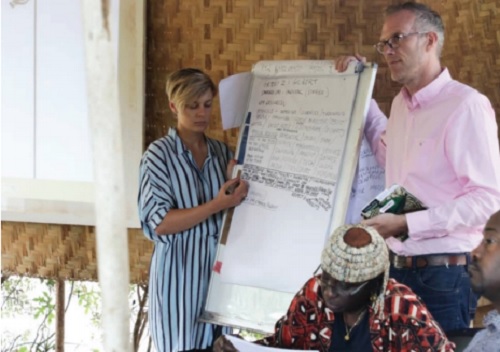
Kampala, Uganda | DOMINIC MUWANGUZI | The creative sector in the East African region is undoubtedly still struggling. The sector employs many youth but government has made noticeable efforts to streamline it.
It is against this backdrop that Dr. Andrew Burton and a team of academics from Newcastle University and Makerere University art school have been conducting workshops at 32⁰ East to enhance careers and livelihoods of artists working on the Kampala art scene.
The workshops are part of the KLA ART 018 program. Dominic Muwanguzi talked to him to find more about these workshops.
What are these workshops you’re conducting in Uganda about?
The workshops are part of a bigger project that seeks to address the issues of sustainable careers and decent livelihoods in the creative sector.
We appreciate that the creative industries are key areas of growth in East Africa, but little investment in the creative sector has been made by local governments in the region to achieve the desired development.
More so, the creative sector has been identified as the biggest employer of the youth who form a greater percentage of the overall population of the East African region.
Ironically, there’s already the East African community Creative and Cultural Industries Bill 2015, intended to boost opportunities for artists but so far little has been heard from it.
These workshops serve as an “intervention” in this pursuit, through engaging art managers, art organizations and artists to acquire the necessary skills and knowledge to improve on their artistic practice.
What skills and knowledge are you passing on to your audience?
The workshops seek to identify those key areas that can benefit artists and all stakeholders in the creative industry to develop their artistic practice like networking, which is crucial in building a sustainable art career and livelihood; entrepreneurship skills for artists and art managers in order for them to compete favourably in the growing art market within the region; opportunities offered by new modes art production, potential benefits for collaborations and professional development in form of writing portfolio and C.Vs for their art.
How sustainable are these workshops?
Through this engagement, we are not concerned with sustainability of workshops because we are not trying to impose a particular model or system on the local art community.
The approach for these workshops is to work collaboratively with local institutions to identify what works for artists. Is it professional development or networking? In Nairobi-Kenya, where we had the first workshop, the first publication on Kenya contemporary art scene, Nairobi Contemporary, was launched recently and it is an artist-led publication.
Similarly, to achieve local ownership of any possible outcome of these workshops, we are working with a team of local art managers and institutions like Margaret Trowel School of Industrial and Fine Art and 32⁰ East who have the experience to work with artists and understandably know what they need.
You are building an installation to be set up at Makerere Art gallery, tell me more about this?
The installation is my personal idea and not connected to this project. I have always felt the need to construct installations that respond to the social or economic landscape of the places I visit. I have done this in different countries like India, China and Korea where I have been inspired to work with available material in the community (found objects) to build artworks that respond or reflect to the nature of environment they are constructed. This installation I am working on at Makerere Art School “The Pop-up Petrol station” is a response to the many petrol stations that are found in Kampala, There is a petrol station for every 100 metres and this has both negative and positive connotations for the population.
The project is funded by Arts Humanities Research Council, the British Institute East Africa and Margaret Trowel School of Industrial and Fine Art. Images courtesy of Joel Tugaineyo.
 The Independent Uganda: You get the Truth we Pay the Price
The Independent Uganda: You get the Truth we Pay the Price


